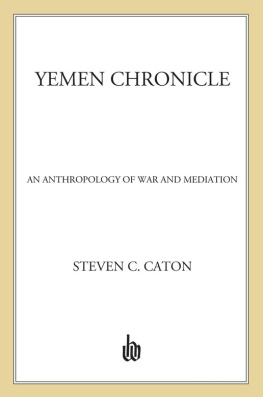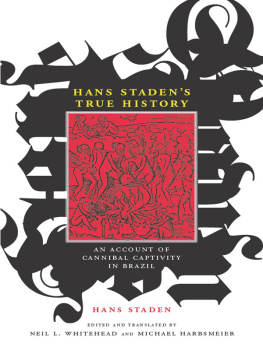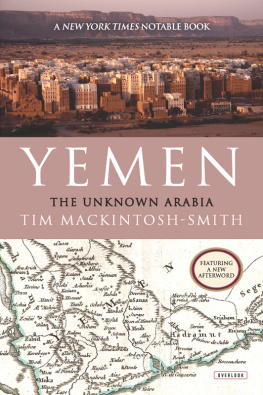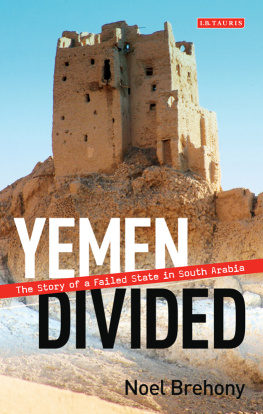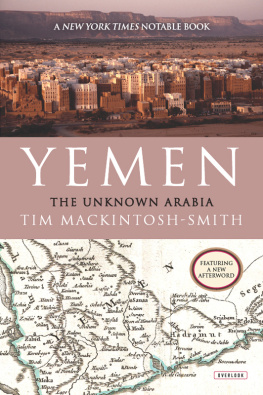ROUTLEDGE LIBRARY EDITIONS: THE GULF
Volume 17
THE YEMEN
THE YEMEN
A Secret Journey
HANS HELFRITZ
Translated by
M. HERON
First published in 1958 by George Allen & Unwin Ltd.
Translated from the German Glckliches Arabien published in 1956 by Fretz and Wasmuth of Zrich
This edition first published in 2016
by Routledge
2 Park Square, Milton Park, Abingdon, Oxon OX14 4RN
and by Routledge
711 Third Avenue, New York, NY 10017
Routledge is an imprint of the Taylor & Francis Group, an informa business
1958 George Allen & Unwin Ltd.
All rights reserved. No part of this book may be reprinted or reproduced or utilised in any form or by any electronic, mechanical, or other means, now known or hereafter invented, including photocopying and recording, or in any information storage or retrieval system, without permission in writing from the publishers.
Trademark notice: Product or corporate names may be trademarks or registered trademarks, and are used only for identification and explanation without intent to infringe.
British Library Cataloguing in Publication Data
A catalogue record for this book is available from the British Library
ISBN: 978-1-138-11959-8 (Set)
ISBN: 978-1-315-64190-4 (Set) (ebk)
ISBN: 978-1-138-18319-3 (Volume 17) (hbk)
Publishers Note
The publisher has gone to great lengths to ensure the quality of this reprint but points out that some imperfections in the original copies may be apparent.
Disclaimer
The publisher has made every effort to trace copyright holders and would welcome correspondence from those they have been unable to trace.
THE YEMEN
A Secret Journey
HANS HELFRITZ
TRANSLATED BY M. HERON
FIRST PUBLISHED IN 1958
This book is copyright under the Berne Convention. Apart from any fair dealing for the purposes of private study, research, criticism or review, as permitted under the Copyright Act 1956, no portion may be reproduced by any process without written permission. Enquiry should be made to the publisher.
George Allen & Unwin Ltd., 1958
Translated from the German
GLCKLICHES ARABIEN
published by Fretz and Wasmuth of Zrich
1956
PRINTED IN GREAT BRITAIN
in 12 point Bembo type
BY C. TINLING & CO. LTD
LIVERPOOL, LONDON AND PRBSCOT
CONTENTS
PLATES
The photographs were taken with a Leica camera made by Ernst Leitz, Wetzlar, using Agfa film
EVEN today, the country which this book is about is one of the least-known corners of the globe. This fact is the more surprising because Arabiaour subjectlies on the threshold of Europe, and one of the busiest world trade routes passes by its coasts. Moreover we know that ancient cultures flourished on the soil of South Arabia and that to look for their remains and excavate their buried treasures might prove just as fascinating as archaeological work in Egypt or Babylonia. There are two reasons why this has not, or virtually not, been done and why Arabia has remained until recently an almost unknown country.
Firstly: after the Crusades, the great but indecisive clash between Christianity and the Arabic-Islamic world, Arabia disappeared from the European horizon. The country which gave birth to Islam lapsed into oblivion. Forgotten, too, were the important influences which Arabian art and science had exerted on the spiritual development of the West at the beginning of the Middle Ages and then again during the Crusades.
Arabia itself, which had swayed the worlds destiny for several centuries, ceased to have a personal history. It made its exit from the stage of events and became a remote and neglected part of the Ottoman Empire. Perhaps a little was known about the Holy Cities of Mecca and Medina, but it was a rare occurrence for an Arabian news item to reach Europe. At the most there might be something in the papers to the effect that the last great Ottoman Sultan, Abdul Hamid, had banished some troublesome dignitary to Arabia, or again, that one of the Turkish officers, who had perhaps received his military education in Germany, was to be sent to the Yemen because he was sympathetic to reform.
Arabia seemed to be defunct. It lay outside the main stream of events. Time passed it by. There were no political events to focus attention on the peninsula which had once influenced the destiny of the Occident so decisively, as was the case in Egypt, and in Mesopotamia when the Baghdad road was built.
The second reason is that there are almost insuperable barriers to its exploration. The first barriers are physical. The coastal mountain ranges of Arabia conceal extensive deserts or barren stretches of steppe. The crossing of such scantily watered, or completely arid, wastes, often extending for hundreds of miles, is extremely difficult and can only be accomplished with the assistance, or at least the friendly toleration, of the inhabitants. But therein precisely lies the biggest obstacle. Men can overcome the hostility of Nature, as the exploration of the polar regions, inter alia, shows us, whereas they often find the enmity of their fellowmen an insurmountable difficulty. In the case of Arabia, this opposition springs from two sources. It is implicit in the social ethos of the masters of the deserts and steppes, the Bedouins. The Bedouin recognizes his own tribe as the sole community towards which he has moral obligations; anyone who does not belong to this narrow blood society is primarily regarded as an enemy, in dealings with whom only the law of the stronger is valid. Thus to attack and plunder peoples of different stock is not only allowed but is a universally recognized moral precept in the battle for existence. Those who are attacked have the right to defend themselves; if they prove the weaker, they assume a correspondingly lower degree in the scale of existence.
The foreigner is naturally subject to this law of the desert also. But his position is even more unfavourable, since he lacks the support and protection of a tribal society. He would have to take a small army with him on journeys into the interior to be sure of travelling in absolute safety. But the ruler of the country would not allow that, quite apart from the countless other reasons which make it impossible.
There are still deeper grounds for the Arabs hostility to strangers; it is rooted in their religion, which regulates every aspect of their life. Islam is exclusive in the highest degree; it could almost be said that it is animated by a passive fanaticism. The Moslem maintains complete reserve in his relations with unbelievers, i.e. with everyone who does not belong to the community of Allah. He does not consider them genuine creations of God and his attitude towards them is naturally antipathetic and distrustful. He does not want to have anything in common with them and refuses them any insight into his modes of thought and feeling, just as he denies them access to his places of worship, at least in those parts where Islam has survived in its strict and unadulterated form, such as Arabia, the country of its origin. Mohammedanism, although it has a great deal in common with Christianity spiritually, is surely the only religion in the world which lays down that entrance into its churches by a member of another faith is punishable by death (in certain districts at least).






